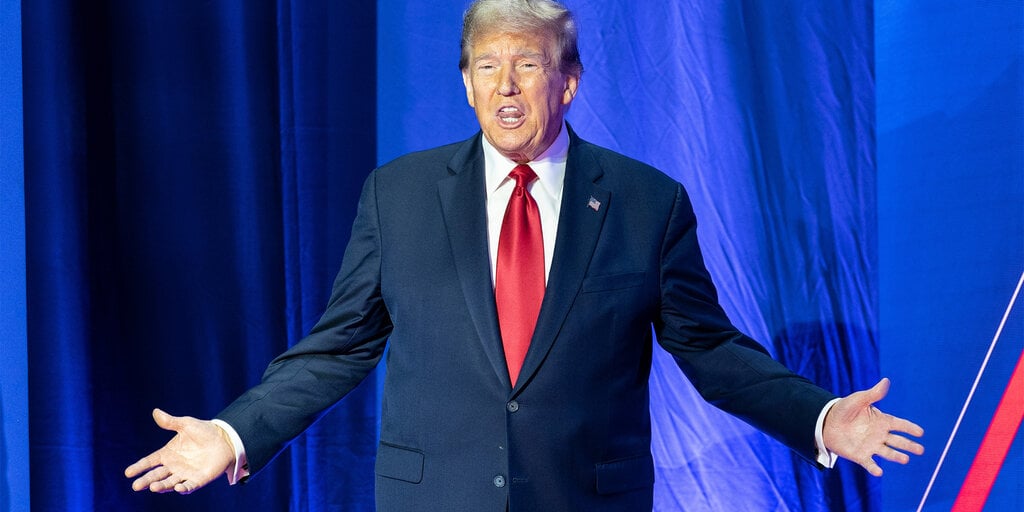Trump's Vision: Musk as Government Efficieny Tsar
Donald Trump proposes a groundbreaking government efficiency commission, with Elon Musk at the helm, aiming to save U.S. taxpayers trillions.
Published September 06, 2024 - 00:09am

Image recovered from decrypt.co
In a significant declaration, Donald Trump, the Republican presidential candidate, reaffirmed his commitment to transforming the U.S. government through a new government efficiency commission. Speaking at the Economic Club of New York, Trump revealed an ambitious plan to reduce waste and improve performance in federal operations, with Tesla and SpaceX CEO Elon Musk proposed as the head of this commission.
Trump's speech highlighted his vision for the United States as the global leader in cryptocurrency, specifically Bitcoin. This stance marks a notable shift from his previous terms. Emphasizing the financial burden of inefficiencies, Trump cited that in 2022 alone, fraud and improper payments amounted to hundreds of billions of dollars in losses for taxpayers. He proposed a complete financial and performance audit of the federal government to address these issues.
Elon Musk, who has vocally supported Trump, expressed his readiness to take on the task. Responding to Trump's proposal, Musk, through his social media platform X (formerly Twitter), noted that eliminating fraud and unnecessary regulations could unlock tremendous prosperity for America. Musk also indicated his involvement with Trump in previous discussions about creating a government efficiency commission, expressing his enthusiasm to lead without seeking compensation or recognition.
Trump's proposal also touched upon broader economic reforms aimed at fostering sectors like cryptocurrency. He suggested eliminating at least ten outdated regulations for every new one introduced, thereby promoting innovation and growth. Trump's evolving stance on digital assets reflects his broader agenda of aligning America with emerging industries to bolster economic growth.
The former president's announcement has stirred significant interest and speculation. According to sources, Trump has been deliberating with his advisors on this idea for months. This public endorsement from both Trump and Musk suggests a concerted effort to bring corporate efficiency principles to government operations.
Support for Trump's proposal has not been confined to the U.S. alone. Reporting from Mexican and German news outlets illustrates the global interest in Trump's strategic moves. These sources highlighted that Trump's plan, if implemented, would significantly impact economic policies and regulatory frameworks, not just domestically but also potentially influencing international norms.
Musk's alignment with right-conservative politics, particularly those which benefit his business ventures, has been evident. His preference for minimal regulation and lower taxes has fueled his support for Trump. Musk's political involvements extend beyond U.S. borders, including support for other right-leaning leaders who favor deregulation. For instance, his endorsement of Argentina's President Javier Milei underscores Musk's advocacy for free-market policies globally.
Criticism surrounding this proposed government efficiency commission revolves around the feasibility and practicality of such broad reforms. Some experts suggest that while the proposal is ambitious, the real-world application may face substantial bureaucratic resistance and political hurdles. Additionally, the focus on drastic cuts and deregulation may conflict with existing public welfare programs and regulatory protections.
Despite these challenges, Trump's announcement has resonated with many voters who see him as a more capable economic manager compared to current Democratic leaders. Public sentiment, as indicated by various polls, suggests a declining confidence in the Democratic administration's handling of economic issues, providing Trump with a strategic advantage in the upcoming elections.
Furthermore, Trump's campaign continues to leverage issues such as inflation to highlight perceived Democratic inefficiencies. He has frequently targeted Vice President Kamala Harris in his critiques, blaming her and the Biden administration for rising costs of goods and services. Although inflation has shown signs of slowing, the sustained high prices have left many consumers dissatisfied.
The broader political implications of this endorsement and the establishment of such a commission reflect a concerted effort by Trump and his allies to reframe governance through a lens of corporate efficiency. This approach aims to appeal particularly to business-minded voters and those critical of bureaucratic spending.
In conclusion, Trump's proposal to create a government efficiency commission headed by Musk is a bold and strategic move. It presents a mix of opportunities and challenges, both in terms of implementation and political reception. As the presidential race intensifies, these proposals will likely become focal points, shaping the discourse around the future of U.S. governance and economic policy.





